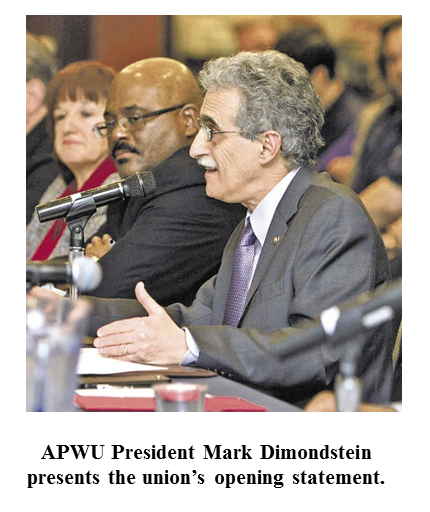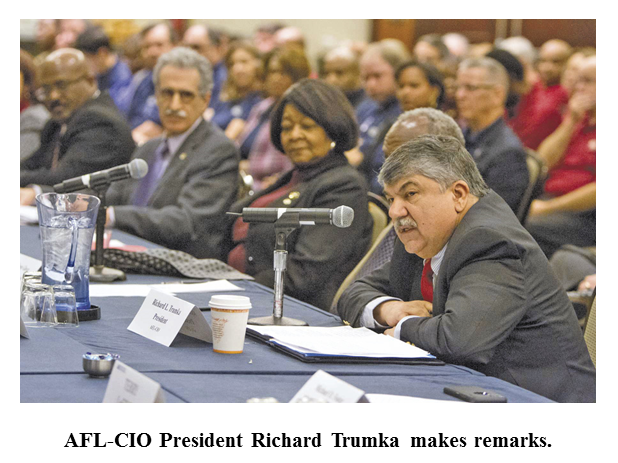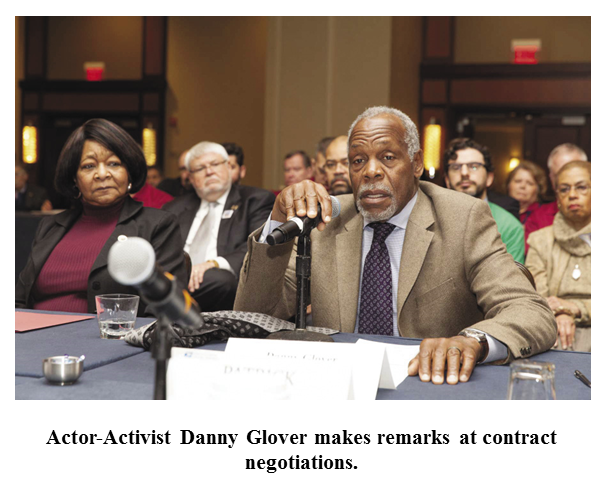A Break from Tradition
March 1, 2015
 (This article first appeared in the March-April 2015 issue of The American Postal Worker magazine.)
(This article first appeared in the March-April 2015 issue of The American Postal Worker magazine.)
Contract negotiations between the American Postal Workers Union and the United States Postal Service got underway on Feb. 19 in a dramatic break with tradition.
Joining the APWU at the opening session were actor-activist Danny Glover and AFL-CIO President Richard Trumka, who made brief remarks following a statement by President Mark Dimondstein. National Association of Letter Carriers President Fredric Rolando joined APWU negotiators at the bargaining table as well.
The presence of special guests was designed to send a message: The U.S. Postal Service belongs to the people, and the people have a stake in the union’s fight to protect and strengthen a great national treasure.
Also observing the session were Congresswoman Eleanor Holmes-Norton (D-DC), along with many who participated in a spirited rally the night before: Jim Hightower, editor of the Hightower Lowdown; Larry Cohen, president of the Communications Workers of America; J. David Cox, president of the American Federation of Government Employees; Clayola Brown, president of the A. Philip Randolph Institute, and Rev. Terry Melvin, president of the Coalition of Black Trade Unionists.
“I am here today as a relatively new president of the APWU because our members are deeply dissatisfied with the current state of affairs and they are looking for and expect change,” Dimondstein said in his opening statement. “Our members want an end to what we call a three-tiered structure that pays workers significantly different amounts for performing the same work.
“We want an end to the situation where new hires can barely make a living wage and where full-time career workers are replaced. We strive for dignity and respect on the job,” he said. “We believe that postal workers should be justly compensated for our service and provided a safe workplace. And after our careers have concluded, enjoy a dignified retirement.”
An Unfamiliar Stage
Danny Glover called the negotiations “an unfamiliar stage” for him but an important one. He noted that he is the son of postal workers and pointed out that he has lived in the same zip code since he was 11 years old.
“I sit here well aware and acknowledging the fact that these negotiations will have a major impact shaping the future of the U.S. Postal Service… and my community.”
 He called on those present to “honor the moment” by “re-examining not only our relationship to each other, but also re-imagining our relationship to the customers and to the other citizens of this great country.”
He called on those present to “honor the moment” by “re-examining not only our relationship to each other, but also re-imagining our relationship to the customers and to the other citizens of this great country.”
Richard Trumka said that he was at the bargaining table in “an unusual capacity,” speaking on behalf of 12.5 million workers represented by the unions of the AFL-CIO. “These bargaining sessions and negotiations are important to the United States and to working families everywhere,” he said.
“For decades the USPS has been a source of good jobs and reliable service. Postal Services have been a cornerstone for all the communities in our great nation...”
“The income gap between the wealthiest and the rest of us is wider than any time in the last century and this brutal fact threatens to drag down our entire national economy,” Trumka remarked. “Yet, right here, workers are sitting across the table from the management in a process that can truly reverse that devastating tale.”
 On the Eve of Negotiations
On the Eve of Negotiations
Over a hundred labor union members, leaders and activists rallied at AFL-CIO headquarters on Feb. 18 and heard passionate calls of solidarity.
Glover recalled how working at the Post Office offered his parents a “different kind of life,” and gave them the opportunity to buy their first home. He called their struggle as postal union activists a “commitment to change” – just as the APWU is fighting for today.
Hightower said he attended the rally “for the small farmers and small business owners. I’m here for the inner-city people…who want to see the Postal Service not shrink, but expand.”
Cohen declared that he would be with the postal workers “every step of the way, saying ‘no’ to plant shutdowns. “We are standing up and we are fighting back!”
“We are coming at the Postal Service as one movement,” said Rev. Melvin. “You are our postal workers and we believe in you.”
“You are standing up and fighting not just for yourself, but all workers,” said Liz Shuler, secretary-treasurer of the AFL-CIO. “What you do at the bargaining table will help every worker in this country!”
AFL-CIO Executive Vice President Tefere Gebre added, “This is not just a postal workers’ fight, this is not just a janitors’ fight or a CWA fight, this is everyone’s fight,” he said. “When we pick up other people’s fights as our own, no one can stop us.”
Cox declared, “We are one solidarity movement… I’m white. I’m black. I’m a postal worker. I’m a federal employee. I’m a communication worker…. Your fight is our fight!”
Dick Thissen, president of the National Active and Retired Federal Employees Association, said, “We’re with you all the way!”
Diane Babineaux, general vice president of the Machinists Union, pointed out that “the Postal Service was a gateway to the middle class for minorities,” adding, “We’re going to be with you.”
‘Ready to Go Out and Fight!’
APWU Local Presidents Nannette Corley and Dena Briscoe also spoke: “I am overwhelmed,” said Corley, of the Montgomery County (MD) Area Local. “I just feel so good inside about what the APWU is doing… I feel the solidarity… I’m ready to go out and fight!”
Briscoe, of the Nation’s Capital, Southern MD Area Local, said, “I really feel involved. My local really feels involved.”
Dimondstein was the final speaker: “The Postal Service doesn’t belong to the American Postal Workers Union, and it doesn’t belong to the managers at L’Enfant Plaza. It belongs to the people of the country,” he said.
Elise Bryant of the Labor Heritage Foundation closed out the rally, leading attendees in a rousing rendition of “Solidarity Forever.”



